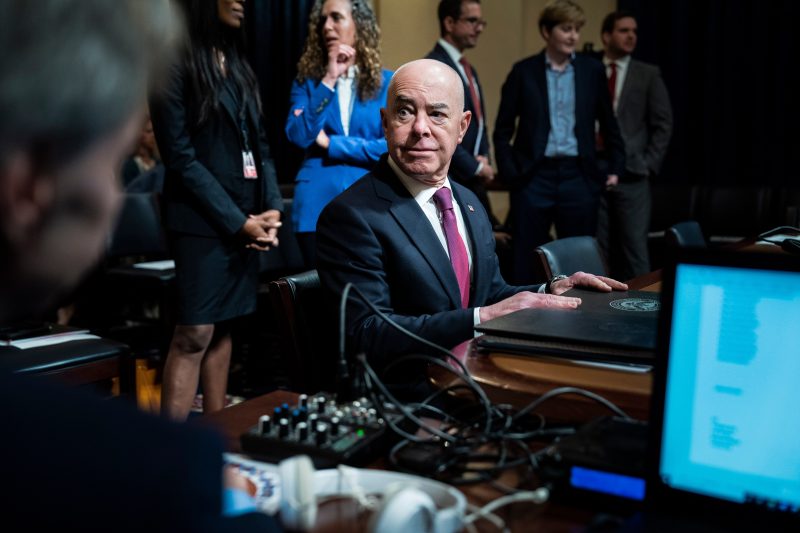
Another GOP impeachment push. Another struggle to isolate an offense.
The fireworks in Congress on Wednesday took place in a House Oversight Committee hearing that featured a cameo from Hunter Biden — who figures heavily into the Republicans’ impeachment investigation into his father — and lots of shouting.
But the more significant developments might have come elsewhere in the Capitol, where House Republicans teed up what could be their first actual Biden administration impeachment, of Homeland Security Secretary Alejandro Mayorkas.
Not only would an impeachment of Mayorkas be only the second of a Cabinet member in history, but Republicans have presented an unusual justification: that Mayorkas warrants impeachment because he has failed at his job.
House Homeland Security Committee Chairman Mark E. Green (R-Tenn.) said in his opening statement, “The founders designed impeachment not just to remove officials engaged in criminal behavior, but those guilty of such gross incompetence that their conduct had endangered their fellow Americans, betrayed the public trust and represented a neglect of duty.”
Rep. Nick LaLota (R-N.Y.) assured the panel that he didn’t take impeachment lightly but that Mayorkas warranted it because of his “true failure and willful dereliction of duty.”
Indeed, the subject of the hearing wasn’t a specific alleged high crime or misdemeanor — the standard set by the Constitution for impeachment — but rather “How Secretary Mayorkas’ Failed Leadership Has Impacted the States.”
To be clear, Republican lawmakers invoked more specific alleged misdeeds.
Some alleged that Mayorkas perjured himself in 2022 testimony when he claimed his department had “operational control” of the border. Republicans have pointed to a definition of that term in a 2006 law that requires literally nothing to come across the border illegally. Mayorkas has since testified that he wasn’t referencing that standard.
Others accused Mayorkas of flouting and failing to enforce immigration laws, including failing to satisfy that absolute standard in the 2006 law. Immigration experts have testified that a lack of resources and the scope of the border problem make executing all such laws and fully securing the border impossible.
But the vast majority of the hearing was geared not toward Mayorkas’s actions, but rather the results.
Multiple Republicans alluded to the idea that the toll of the fentanyl crisis meant Mayorkas meets the standard for impeachment.
Rep. Morgan Luttrell (R-Tex.) asked Democratic witness and constitutional law professor Frank O. Bowman, “Is the selling of fentanyl inside the United States, causing hundreds of thousands of deaths over the past years, considered a high crime?”
“I’m unaware of any evidence that Secretary Mayorkas has ever sold” fentanyl, Bowman responded.
After a similar exchange about sex slavery, Luttrell indicated his point was that since Mayorkas had “failed to conduct his job for the past few years, we need somebody else.”
Rep. Carlos A. Gimenez (R-Fla.) noted that Bowman had testified that impeachment was meant for an offense that was “extraordinarily serious in degree” and that “corrupts or subverts governmental processes or the constitutional order.”
“Do you believe that the death of 200,000 Americans from fentanyl overdoses — is that extraordinarily serious?” Gimenez asked.
These were crystallizing moments. Bowman’s testimony had been about the seriousness of the alleged impeachment offenses; the questions were about the seriousness of the crisis.
The actual standard for impeachable offenses is the subject of plenty of scholarly debate.
Green pointed to a scholar from the conservative Heritage Foundation who has argued for Mayorkas’s impeachment by contending that it was sufficient to be “failing to carry out the duties of his office or by acting in contravention of those duties.”
But that is hardly a consensus view. Jonathan Turley, a key Republican witness in impeachment proceedings involving both Donald Trump and President Biden in recent years, wrote a column this week disagreeing with Mayorkas’s impeachment.
“Being bad at your job is not an impeachable offense. Even really bad. Even Mayorkas’ level of bad,” wrote Turley, who made it clear he was not a fan of Mayorkas’s. “If that were the case, he would be only the latest in a long line of cabinet officers frog-marched into Congress for constitutional termination.”
Turley said the framers of the Constitution rejected terms like “maladministration” as impeachable offenses because of how broad such a standard would be. He said impeaching Mayorkas risked “making any policy disagreement with a cabinet member a high crime and misdemeanor.”
Green rejected this argument at the end of Wednesday’s hearing, saying that “insisting on enforcing the law as written by Congress is not a policy difference.”
Precisely how slippery that slope would be, it’s hard to know. What’s clear is that this represents an evolution on the subject for the Republican Party. During Trump’s first impeachment, Republicans often suggested impeachment should focus not only on a specific offense, but on an actual statutory crime.
Perhaps Republicans will focus on specific offenses as the proceedings continue. But the subject of the hearing Wednesday — combined with Republicans’ nonspecific and speculative impeachment inquiry of Biden — suggests they aren’t too intent on doing so.
